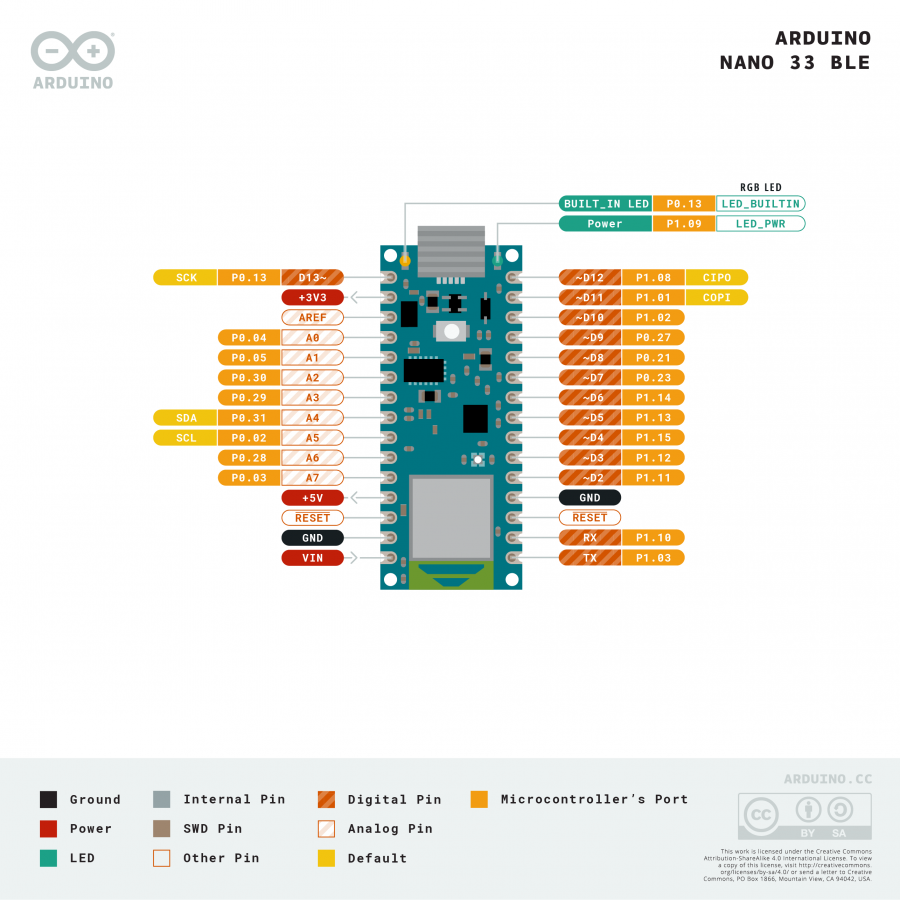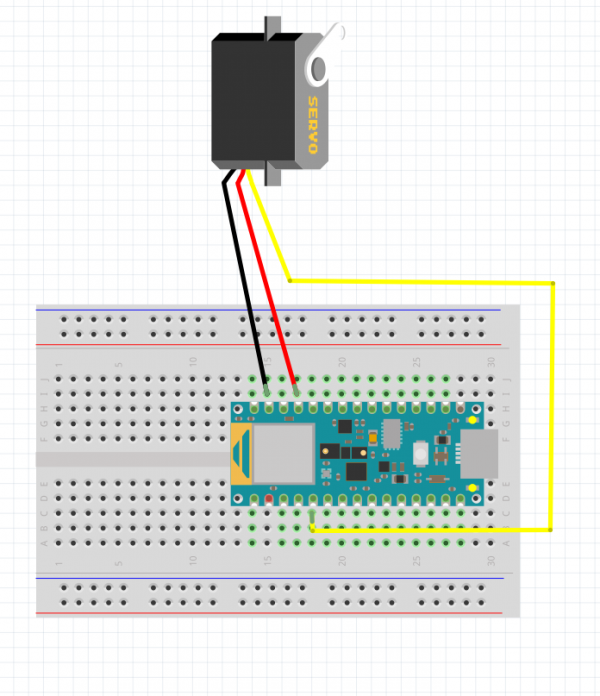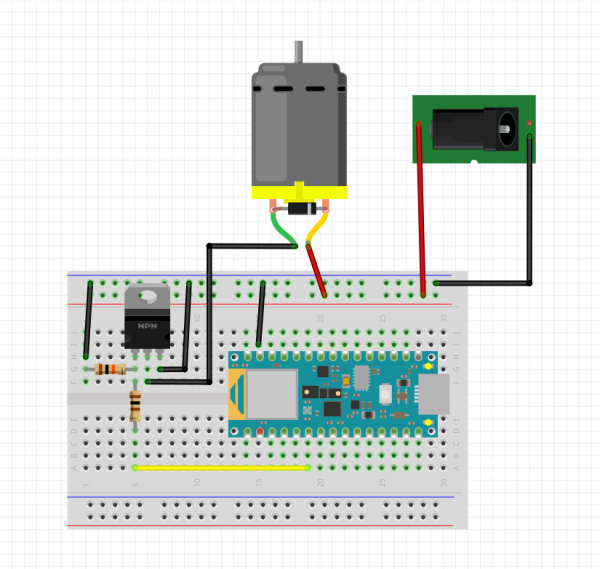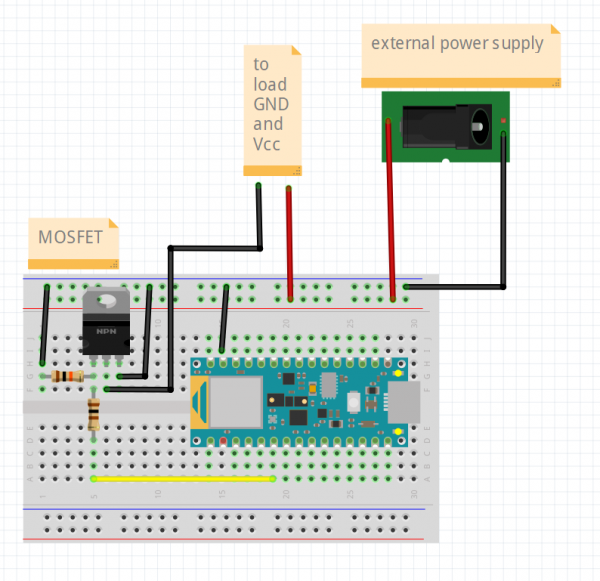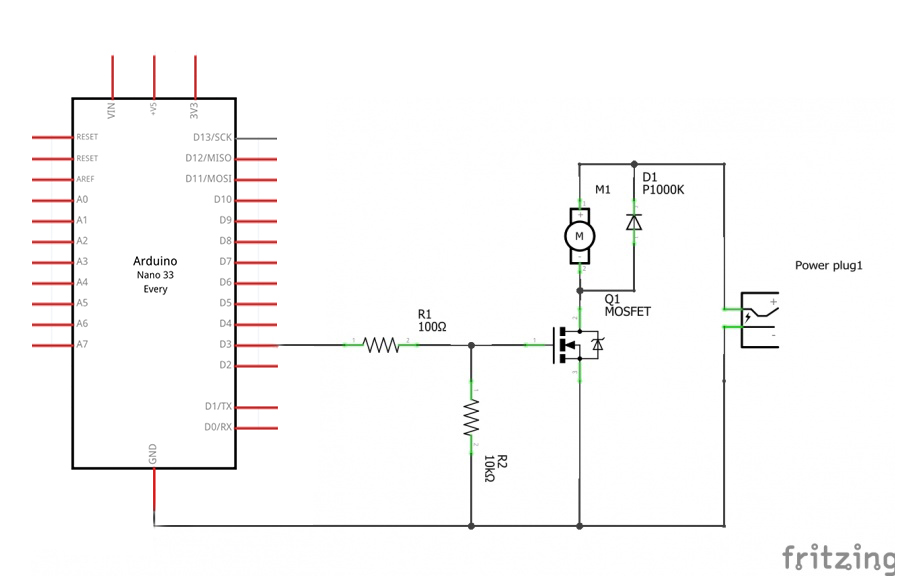Difference between revisions of "Using motion recognition on the Arduino"
Jump to navigation
Jump to search
(→Serso) |
|||
| (5 intermediate revisions by 2 users not shown) | |||
| Line 323: | Line 323: | ||
===Arduino BLE 33 sense pinout=== | ===Arduino BLE 33 sense pinout=== | ||
[[File:SRL-image-0.png | 900 px]] | [[File:SRL-image-0.png | 900 px]] | ||
| − | === | + | ===Servo=== |
The servo motor can connect directly to a PWM digital pin, check pinout above. <br> | The servo motor can connect directly to a PWM digital pin, check pinout above. <br> | ||
On the image below, the signal line (yellow wire) is connected to D2. <br> | On the image below, the signal line (yellow wire) is connected to D2. <br> | ||
| Line 376: | Line 376: | ||
myservo.attach(2); // attaches the servo on pin 2 to the servo object | myservo.attach(2); // attaches the servo on pin 2 to the servo object | ||
| − | pinMode(3, OUTPUT); //pin number 3 defined as output, can connect | + | pinMode(3, OUTPUT); //pin number 3 defined as output, can connect fan + various actuators, lights(fan, solenoid,vibration motor, led strip, relay, etc.) |
| − | pinMode(4, OUTPUT); //pin number 4 defined as output, can connect various actuators, lights(fan, solenoid,vibration motor, led strip, relay, etc.) | + | pinMode(4, OUTPUT); //pin number 4 defined as output, can connect DC motor + various actuators, lights(fan, solenoid,vibration motor, led strip, relay, etc.) |
digitalWrite(LEDR, HIGH); | digitalWrite(LEDR, HIGH); | ||
| Line 484: | Line 484: | ||
<br> | <br> | ||
<br> | <br> | ||
| + | |||
| + | [[Category:Motion Tracking]][[Category:Arduino]][[Category:Classification Models]] | ||
Latest revision as of 11:42, 6 March 2023
Explanation coming soon ...
Sender (Central)
Swap out the first line with your trained model library
#include <Interfaces-Sense_inferencing.h> // Change to your model library
#include <ArduinoBLE.h>
#include <Arduino_APDS9960.h>
#include <Arduino_LSM9DS1.h>
#define CONVERT_G_TO_MS2 9.80665f
#define MAX_ACCEPTED_RANGE 2.0f
static bool debug_nn = false;
const char* deviceServiceUuid = "19b10000-e8f2-537e-4f6c-d104768a1214";
const char* deviceServiceCharacteristicUuid = "19b10001-e8f2-537e-4f6c-d104768a1214";
int gesture = -1;
int oldGestureValue = -1;
void setup() {
Serial.begin(9600);
pinMode(LEDR, OUTPUT);
pinMode(LEDG, OUTPUT);
pinMode(LEDB, OUTPUT);
pinMode(LED_BUILTIN, OUTPUT);
digitalWrite(LEDR, LOW);
digitalWrite(LEDG, HIGH);
digitalWrite(LEDB, HIGH);
digitalWrite(LED_BUILTIN, LOW);
if (!IMU.begin()) {
Serial.println("- Failed to initialize accelerometer!");
}
else {
Serial.println("- Accelerometer initialized!");
}
if (EI_CLASSIFIER_RAW_SAMPLES_PER_FRAME != 3) {
Serial.println("EI_CLASSIFIER_RAW_SAMPLES_PER_FRAME should be equal to 3 (x,y,z)");
return;
}
if (!BLE.begin()) {
Serial.println("- Starting BLE module failed!");
while (1);
}
BLE.setLocalName("Nano 33 BLE Sense (Central)");
BLE.advertise();
}
void loop() {
connectToPeripheral();
}
void connectToPeripheral(){
BLEDevice peripheral;
Serial.println("- Discovering peripheral device...");
do
{
BLE.scanForUuid(deviceServiceUuid);
peripheral = BLE.available();
} while (!peripheral);
if (peripheral) {
Serial.println("* Peripheral device found!");
Serial.print("* Device MAC address: ");
Serial.println(peripheral.address());
Serial.print("* Device name: ");
Serial.println(peripheral.localName());
Serial.print("* Advertised service UUID: ");
Serial.println(peripheral.advertisedServiceUuid());
Serial.println(" ");
BLE.stopScan();
controlPeripheral(peripheral);
}
}
void controlPeripheral(BLEDevice peripheral) {
Serial.println("- Connecting to peripheral device...");
if (peripheral.connect()) {
Serial.println("* Connected to peripheral device!");
Serial.println(" ");
// Change LED to green
digitalWrite(LEDR, HIGH);
digitalWrite(LEDG, LOW);
digitalWrite(LEDB, HIGH);
digitalWrite(LED_BUILTIN, LOW);
} else {
Serial.println("* Connection to peripheral device failed!");
Serial.println(" ");
return;
}
Serial.println("- Discovering peripheral device attributes...");
if (peripheral.discoverAttributes()) {
Serial.println("* Peripheral device attributes discovered!");
Serial.println(" ");
} else {
Serial.println("* Peripheral device attributes discovery failed!");
Serial.println(" ");
peripheral.disconnect();
return;
}
BLECharacteristic gestureCharacteristic = peripheral.characteristic(deviceServiceCharacteristicUuid);
if (!gestureCharacteristic) {
Serial.println("* Peripheral device does not have gesture_type characteristic!");
peripheral.disconnect();
return;
} else if (!gestureCharacteristic.canWrite()) {
Serial.println("* Peripheral does not have a writable gesture_type characteristic!");
peripheral.disconnect();
return;
}
while (peripheral.connected()) {
gesture = gestureDetection();
if (oldGestureValue != gesture) {
oldGestureValue = gesture;
Serial.print("- Writing value to gesture characteristic: ");
Serial.println(gesture);
gestureCharacteristic.writeValue((byte)gesture);
Serial.println("- Writing value to gesture characteristic done!");
Serial.println(" ");
}
}
Serial.println("- Peripheral device disconnected!");
// Change LED to red
digitalWrite(LEDR, LOW);
digitalWrite(LEDG, HIGH);
digitalWrite(LEDB, HIGH);
digitalWrite(LED_BUILTIN, LOW);
}
int gestureDetection()
{
int gesture_index;
Serial.println("- Start inferencing in 2 second...");
delay(2000);
Serial.println("- Getting accelorometer sample...");
// Allocate a buffer here for the values we'll read from the IMU
float buffer[EI_CLASSIFIER_DSP_INPUT_FRAME_SIZE] = { 0 };
for (size_t ix = 0; ix < EI_CLASSIFIER_DSP_INPUT_FRAME_SIZE; ix += 3) {
// Determine the next tick (and then sleep later)
uint64_t next_tick = micros() + (EI_CLASSIFIER_INTERVAL_MS * 1000);
IMU.readAcceleration(buffer[ix], buffer[ix + 1], buffer[ix + 2]);
for (int i = 0; i < 3; i++) {
if (fabs(buffer[ix + i]) > MAX_ACCEPTED_RANGE) {
buffer[ix + i] = ei_get_sign(buffer[ix + i]) * MAX_ACCEPTED_RANGE;
}
}
buffer[ix + 0] *= CONVERT_G_TO_MS2;
buffer[ix + 1] *= CONVERT_G_TO_MS2;
buffer[ix + 2] *= CONVERT_G_TO_MS2;
delayMicroseconds(next_tick - micros());
}
// Turn the raw buffer in a signal which we can the classify
signal_t signal;
int err = numpy::signal_from_buffer(buffer, EI_CLASSIFIER_DSP_INPUT_FRAME_SIZE, &signal);
if (err != 0) {
Serial.println("Failed to create a signal!");
return -1;
}
// Run the classifier
ei_impulse_result_t result = { 0 };
err = run_classifier(&signal, &result, debug_nn);
if (err != EI_IMPULSE_OK) {
Serial.println("Failed to run classifier!");
return -1;
}
for (int ix = 0; ix < EI_CLASSIFIER_LABEL_COUNT; ix++) {
if (result.classification[ix].value > 0.8) {
gesture_index = ix;
Serial.println(" ");
Serial.print("* Detected gesture: ");
Serial.print(result.classification[ix].label);
Serial.print(" with index number: ");
Serial.println(ix);
Serial.println(" ");
}
}
return gesture_index;
}
float ei_get_sign(float number) {
return (number >= 0.0) ? 1.0 : -1.0;
}
Receiver (Peripheral)
#include <ArduinoBLE.h>
enum {
GESTURE_NONE = -1,
GESTURE_SLEEP = 0,
GESTURE_UPDOWN = 1,
GESTURE_WAVE = 2,
};
const char* deviceServiceUuid = "19b10000-e8f2-537e-4f6c-d104768a1214";
const char* deviceServiceCharacteristicUuid = "19b10001-e8f2-537e-4f6c-d104768a1214";
int gesture = -1;
BLEService gestureService(deviceServiceUuid);
BLEByteCharacteristic gestureCharacteristic(deviceServiceCharacteristicUuid, BLERead | BLEWrite);
void setup() {
Serial.begin(9600);
pinMode(LEDR, OUTPUT);
pinMode(LEDG, OUTPUT);
pinMode(LEDB, OUTPUT);
pinMode(LED_BUILTIN, OUTPUT);
digitalWrite(LEDR, HIGH);
digitalWrite(LEDG, HIGH);
digitalWrite(LEDB, HIGH);
digitalWrite(LED_BUILTIN, LOW);
if (!BLE.begin()) {
Serial.println("- Starting BLE module failed!");
while (1);
}
BLE.setLocalName("Nano 33 BLE Sense (Peripheral)");
BLE.setAdvertisedService(gestureService);
gestureService.addCharacteristic(gestureCharacteristic);
BLE.addService(gestureService);
gestureCharacteristic.writeValue(-1);
BLE.advertise();
}
void loop() {
BLEDevice central = BLE.central();
Serial.println("- Discovering central device...");
delay(500);
if (central) {
Serial.println("* Connected to central device!");
Serial.print("* Device MAC address: ");
Serial.println(central.address());
Serial.println(" ");
while (central.connected()) {
if (gestureCharacteristic.written()) {
gesture = gestureCharacteristic.value();
writeGesture(gesture);
}
}
Serial.println("* Disconnected to central device!");
}
}
void writeGesture(int gesture) {
Serial.println("- Gesture characteristic has changed!");
switch (gesture) {
case GESTURE_SLEEP:
Serial.println("* Actual value: SLEEP (0) (red LED on)");
Serial.println(" ");
digitalWrite(LEDR, LOW);
digitalWrite(LEDG, HIGH);
digitalWrite(LEDB, HIGH);
digitalWrite(LED_BUILTIN, LOW);
break;
case GESTURE_UPDOWN:
Serial.println("* Actual value: UPDOWN (1) (green LED on)");
Serial.println(" ");
digitalWrite(LEDR, HIGH);
digitalWrite(LEDG, LOW);
digitalWrite(LEDB, HIGH);
digitalWrite(LED_BUILTIN, LOW);
break;
case GESTURE_WAVE:
Serial.println("* Actual value: WAVE (2) (blue LED on)");
Serial.println(" ");
digitalWrite(LEDR, HIGH);
digitalWrite(LEDG, HIGH);
digitalWrite(LEDB, LOW);
digitalWrite(LED_BUILTIN, LOW);
break;
default:
digitalWrite(LEDR, HIGH);
digitalWrite(LEDG, HIGH);
digitalWrite(LEDB, HIGH);
digitalWrite(LED_BUILTIN, LOW);
break;
}
}
Connect some Outputs
Arduino BLE 33 sense pinout
Servo
The servo motor can connect directly to a PWM digital pin, check pinout above.
On the image below, the signal line (yellow wire) is connected to D2.
Black is GND and red is connected to +5V (beware need to solder a pad on the bottom of the Arduino in order to activate the 5V pin)
DC motor + other higher voltage load
Receiver (Peripheral) with Servo motor /DC motor, etc.
#include <ArduinoBLE.h>
#include <Servo.h>
enum {
GESTURE_NONE = -1,
GESTURE_SLEEP = 0,
GESTURE_UPDOWN = 1,
GESTURE_WAVE = 2,
};
const char* deviceServiceUuid = "19b10000-e8f2-537e-4f6c-d104768a1214";
const char* deviceServiceCharacteristicUuid = "19b10001-e8f2-537e-4f6c-d104768a1214";
int gesture = -1;
BLEService gestureService(deviceServiceUuid);
BLEByteCharacteristic gestureCharacteristic(deviceServiceCharacteristicUuid, BLERead | BLEWrite);
Servo myservo; // create servo object to control a servo
// twelve servo objects can be created on most boards
void setup() {
Serial.begin(9600);
pinMode(LEDR, OUTPUT);
pinMode(LEDG, OUTPUT);
pinMode(LEDB, OUTPUT);
pinMode(LED_BUILTIN, OUTPUT);
myservo.attach(2); // attaches the servo on pin 2 to the servo object
pinMode(3, OUTPUT); //pin number 3 defined as output, can connect fan + various actuators, lights(fan, solenoid,vibration motor, led strip, relay, etc.)
pinMode(4, OUTPUT); //pin number 4 defined as output, can connect DC motor + various actuators, lights(fan, solenoid,vibration motor, led strip, relay, etc.)
digitalWrite(LEDR, HIGH);
digitalWrite(LEDG, HIGH);
digitalWrite(LEDB, HIGH);
digitalWrite(LED_BUILTIN, LOW);
if (!BLE.begin()) {
Serial.println("- Starting BLE module failed!");
while (1);
}
BLE.setLocalName("Nano 33 BLE Sense (Peripheral)");
BLE.setAdvertisedService(gestureService);
gestureService.addCharacteristic(gestureCharacteristic);
BLE.addService(gestureService);
gestureCharacteristic.writeValue(-1);
BLE.advertise();
}
void loop() {
BLEDevice central = BLE.central();
Serial.println("- Discovering central device...");
delay(500);
if (central) {
Serial.println("* Connected to central device!");
Serial.print("* Device MAC address: ");
Serial.println(central.address());
Serial.println(" ");
while (central.connected()) {
if (gestureCharacteristic.written()) {
gesture = gestureCharacteristic.value();
writeGesture(gesture);
}
}
Serial.println("* Disconnected to central device!");
}
}
void writeGesture(int gesture) {
Serial.println("- Gesture characteristic has changed!");
switch (gesture) {
case GESTURE_SLEEP:
Serial.println("* Actual value: SLEEP (0) (red LED on)");
Serial.println(" ");
digitalWrite(LEDR, LOW);
digitalWrite(LEDG, HIGH);
digitalWrite(LEDB, HIGH);
digitalWrite(LED_BUILTIN, LOW);
myservo.write(10); // tell servo to go to position 10 degrees
digitalWrite(3, LOW);
digitalWrite(4, LOW);
break;
case GESTURE_UPDOWN:
Serial.println("* Actual value: UPDOWN (1) (green LED on)");
Serial.println(" ");
digitalWrite(LEDR, HIGH);
digitalWrite(LEDG, LOW);
digitalWrite(LEDB, HIGH);
digitalWrite(LED_BUILTIN, LOW);
myservo.write(50); // tell servo to go to position 50 degrees
digitalWrite(3, HIGH); // start DC motor
digitalWrite(4, LOW); // fan is off
break;
case GESTURE_WAVE:
Serial.println("* Actual value: WAVE (2) (blue LED on)");
Serial.println(" ");
digitalWrite(LEDR, HIGH);
digitalWrite(LEDG, HIGH);
digitalWrite(LEDB, LOW);
digitalWrite(LED_BUILTIN, LOW);
myservo.write(180); // tell servo to go to position 180 degrees
digitalWrite(3, LOW); // DC motor is off
digitalWrite(4, HIGH); // run fan
break;
default:
digitalWrite(LEDR, HIGH);
digitalWrite(LEDG, HIGH);
digitalWrite(LEDB, HIGH);
digitalWrite(LED_BUILTIN, LOW);
myservo.write(10); // tell servo to go to position 10 degrees
digitalWrite(3, LOW); // DC motor is off
digitalWrite(4, LOW); // fan is off
break;
}
}
